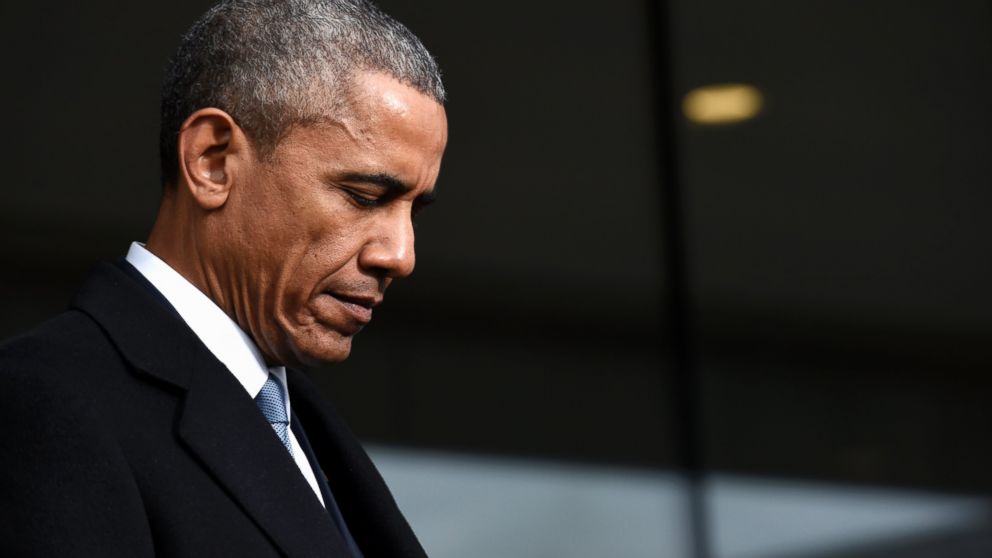Obama's Approval Rating Flattens -- Albeit With No Sign of GOP Tailwinds (POLL)
A flattened approval rating is softened by some underlying gains.

— -- A flattened approval rating is softened by some underlying gains for Barack Obama in the latest ABC News/Washington Post poll -- with no sign of tailwinds for the Republicans in Congress.
After a 9-point jump in overall approval in January, Obama’s landed at an even split: Forty-seven percent of Americans approve of his work in office, while 47 percent disapprove. Partisan and ideological divisions are profound, including a record low in approval from Republicans.
See PDF with full results and charts here.
But Congress overall, and the Republicans who now control it, remain in considerably worse shape, with 22 and 27 percent approval, respectively. The latter shows no renaissance in GOP ratings after the party’s big gains in last fall’s midterm elections. Instead, perhaps given the fractious nature of the Republican caucus, the public by a 7-point margin says it’s Obama who’s taking a stronger leadership role in the government these days.
That compares with a scant 2-point gap between them in January. Further, among people who see Obama as taking the leading role in Washington, 73 percent say that’s a good thing. Among those who see the Republicans as taking the lead, fewer call it a good thing, 58 percent.
Even with the lack of momentum in his overall approval, Obama’s rating for handling the economy, 49 percent, is numerically its highest (albeit by a single point) since January 2013, shortly after he won re-election. And he’s tied with the Republicans in Congress in trust to handle the economy – a measure on which the president trailed by 9 percentage points in mid-December.
The Democrats in Congress, for their part, have rebounded from 30 percent approval last October, advancing by 8 points to come within a single point of their best since 2009. While hardly popular, they may be benefitting simply from not being at the helm. Congressional Republicans’ approval rating, by contrast, is a non-significant +2 points from its level in mid-October.
And while 33 percent of Americans disapprove “strongly” of the Democrats in Congress, that rises to 44 percent for the GOP. These differences aside, political sentiment overall is largely at loggerheads. One basic question in this poll, produced for ABC by Langer Research Associates, asks whether Americans trust Obama or the Republicans in Congress more to handle the nation’s main problems. Like Obama’s job rating and trust on the economy, the result is another even split, 42-41 percent, in a gauge on which he led by 15 points after his re-election.
THE ECONOMY – The economy, while better, still is an irritant. Well fewer than half, 40 percent, say it’s in good shape, essentially unchanged from January after improving sharply in the fall. It matters, particularly in Obama’s ratings; he gets 72 percent approval among those who say the economy is excellent or good, plummeting to 38 percent among those who say it’s not so good and just 12 percent among those who say it’s in poor shape.
There’s essentially no such effect for Congress, however; it’s in the tank regardless of economic attitudes. At the same time, economic and political views are closely related, a phenomenon that may occur especially when economic conditions are mixed, opening the door for political predispositions to color such judgments. Sixty-one percent of Democrats say the economy’s in good shape; just 37 percent of independents and 22 percent of Republicans agree.
POLITICAL and OTHER GROUPS – More generally, while it’s become commonplace to note the extremely sharp political and ideological divisions in this country, they’re still breathtaking. Obama has a 7 percent job approval rating from Republicans in this survey – his lowest on record in 74 ABC/Post polls to ask the question since he took office.
That compares with 79 percent approval among Democrats and 48 percent among independents. Obama’s rating is notable in even longer historical terms. Ronald Reagan never got less than 20 percent approval among Democrats in ABC/Post polls, and George H.W. Bush and Bill Clinton never did worse than 13 and 12 percent in the opposition party, respectively. George W. Bush did go lower than Obama, 5 percent approval from Democrats, but at a time when he was in desperate straits generally, including just 18 percent approval from independents (and 57 percent in his own party). Further, Obama’s approval rating ranges from 78 percent among nonwhites (including 94 percent among blacks) to 32 percent among whites.
That 46-point gap is the widest of his presidency. (Notably, too, the Democrats in Congress have gained a broad 20 points in approval from nonwhites since October.) Even with a split in approval, another result indicates that Obama’s 2012 coalition still breathes. His approval rating is 52 percent in the blue states he won for a second term. It drops sharply, to 38 percent, in the red states he lost to Mitt Romney.
As far as the parties in Congress go, one reason for the approval gap between Democrats and Republicans is that the Democrats are more popular in their base (69 percent approval) than are congressional Republicans in theirs (52 percent). It helps Obama that self-identified Democrats outnumber Republicans, 30 to 22 percent. But, as has become customary in these politically disaffected times, independents predominate, and they give 8 points more approval to the Democrats in Congress than to the Republicans now running the show.
METHODOLOGY – This ABC News/Washington Post poll was conducted by landline and cellular telephone March 26-29, 2015, in English and Spanish, among a random national sample of 1,003 adults. Results have a margin of sampling error of 3.5 points, including design effect. Partisan divisions are 30-22-38 percent, Democrats-Republicans-independents. The survey was produced for ABC News by Langer Research Associates of New York, N.Y., with sampling, data collection and tabulation by Abt-SRBI of New York, N.Y.




